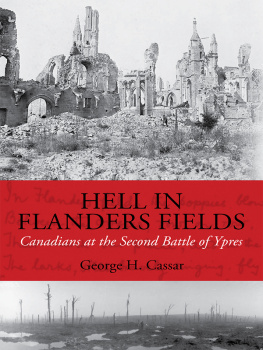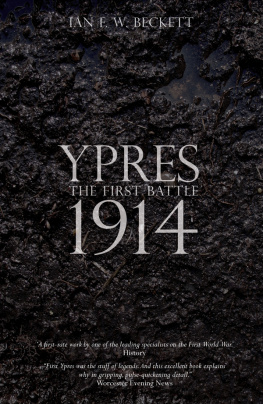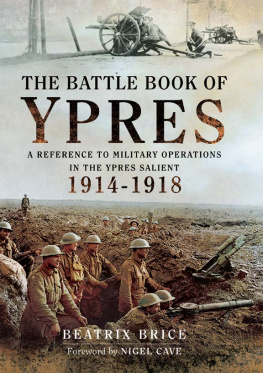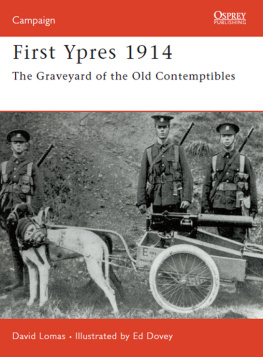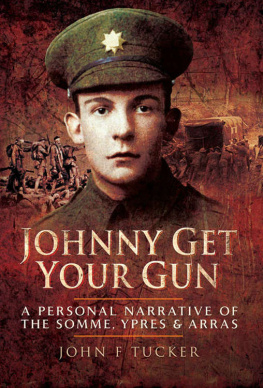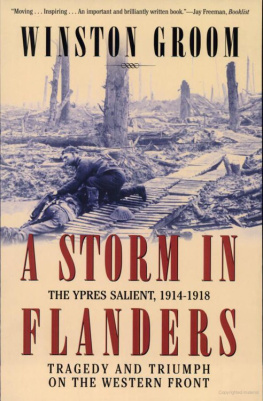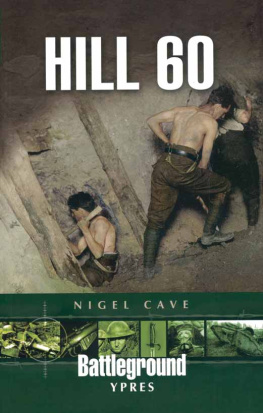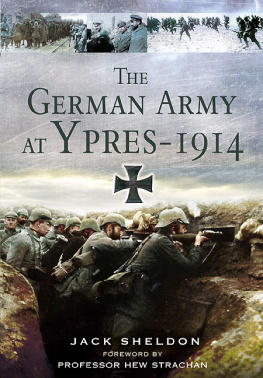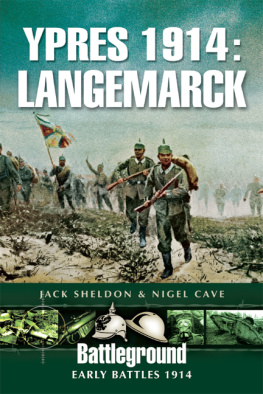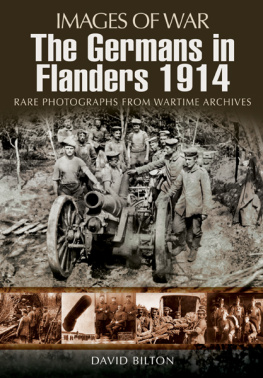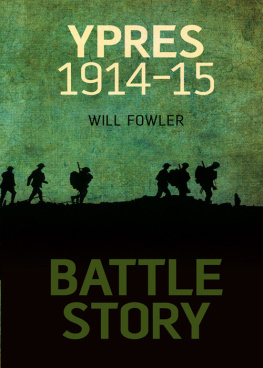Trial by Gas
Trial by Gas
The British Army at the
Second Battle of Ypres
GEORGE H. CASSAR

2014 by the Board of Regents of the University of Nebraska
Maps by Don Lafreniere.
All rights reserved. Potomac Books is an imprint of the
University of Nebraska Press.
Manufactured in the United States of America.

Library of Congress Cataloging-in-Publication Data
Cassar, George H.
Trial by gas: the British Army at the Second Battle of Ypres /
George H. Cassar.
pages cm.
Includes bibliographical references and index.
ISBN 978-1-61234-690-8 (hardcover: alk. paper)
ISBN 978-1-61234-691-5 (pdf)
1. Ypres, 2nd Battle of, Ieper, Belgium, 1915. 2. Great Britain.
ArmyHistory20th century. 3. Gases, Asphyxiating and
poisonousWar useHistory20th century. I. Title.
II. Title: British Army at the Second Battle of Ypres.
D542.Y7C374 2014
940.424dc23
2014027490
Set in Lyon by Lindsey Auten.
To the memory of the men
in the Second British Army who
fought and laid down their lives in one of the
most notorious and dreaded places in the Great War
Contents
Illustrations
Following page
Maps
Preface
THE SECOND BATTLE OF YPRES was the longest and bloodiest engagement on the western front in 1915. It started on the afternoon of 22 April when the Germans introduced poison gas, directed mainly against French troopsa division of Algerians and one territorial consisting of aged reservistsat the juncture of the Allied front. Taken by surprise and with no protection against the new horror, the two French divisions retreated in panic, opening a gap of over four miles in the Allied line. As the Germans advanced into the breach, they ran into the 1st Canadian Division manning the end of the British line where it joined the French.
The Canadians had only recently taken their place in the Ypres Salient and were fortunate in that they received a lighter dose of gas than the French. The division, composed mostly of raw volunteers, was all that lay between the Germans and an Allied rout. Possessing a courage born out of ignorance of war and perhaps sheer stubbornness, the vastly outnumbered Canadians stood their ground long enough for reinforcements to come up and form a frail line across the gap.
On 24 April, the Canadians themselves were in the direct line of another gas attack, which they faced with only rags or handkerchiefs soaked in urine or water as improvised respirators. Gasping, their eyes running, struggling to breathe and see, the Canadians fought and died amid the swirling gas cloud but, incredibly, managed to hold the line. What remained of the Canadian Division was taken out of the firing line toward the end of April, as the battle continued into May with the British fighting valiantly and preventing any significant erosion of their position. By refusing to yield, the Second British Army had prevented the tide of war from turning in favor of the Germans.
Second Ypres comprised four distinct engagements: the Battle of Gravenstafel (2223 April), the Battle of St. Julien (24 April4 May), the Battle of Frezenberg Ridge (813 May), and the Battle of Bellewaarde Ridge (2425 May). The 1st Canadian Division was heavily involved in the first two actions, while British units fought on practically alone in the latter two. The Second Battle of Ypres sputtered out after 25 May with both sides exhausted.
The Second Battle of Ypres has been overshadowed by larger and more costly battles in the Great War and that undoubtedly explains why it has not attracted more interest from military writers. Still, it does not deserve to be relegated to inconsequential action, especially in view of the adverse consequences that would have flowed from a German victory.
There are a number of studies on aspects of Second Ypres, but hitherto only two covered the battle in any depth from start to finish. The first, in 1927, was the British Official History, written by James Edmonds; the other, three-quarters of a century later, was Magnificent But Not War, by John Dixon. The British Official History is quite compact, well organized, generally free of mistakes, and indispensable for a study of the hectic struggle, but there are obvious gaps. As the Official Historian, Edmonds, by his own admission, was not a free agent. His criticism of faulty strategy and planning and dubious action by the responsible leaders was circumspect, if at all voiced, and there were incidents that he treated only superficially or omitted altogether. John Dixon, known previously to me for his extensive and valuable research on the Monmouthshires, helped to redress some of the imbalance.
I undertook to write about Second Ypres, a battle that has long held special interest for me as a Canadian, because I felt I could further round the picture as well as bring greater recognition to the men who fought and died in that hellhole. It was my intention at the outset to pack the complete story of the Second Battle of Ypres into a single volume. As the work progressed, I realized that the study would exceed 200,000 words and that, in these troubled economic times, it would be difficult, if not impossible, to find a reputable publisher. Consequently, after I had fully covered the role of the Canadiansby then the number of words approached 120,000I sent the manuscript to Dundurn Press in Toronto, which accepted it without (thankfully) requesting any revisions. The book, published under the title Hell in Flanders Fields, came out in the summer of 2010.
Any sequel to an earlier study normally begins from where the author left off. In this case it was not possible. It went without saying that there would be readers unfamiliar with, or possessing only a sketchy knowledge of, the first phase of the battle. But a clear view of Second Ypres cannot emerge without an understanding of the early events. Thus, I condensed Hell in Flanders Fields to about 16,000 words, which became the opening chapter of the battle.
In grappling with the second phase of the battle, it was to be expected that I would disagree with some of the conclusions of my two predecessors, Sir James Edmonds and John Dixon, but that does not diminish their contribution, which I found to be of inestimable value in illuminating my path, particularly in addressing the order of eventsnot an easy task, as it was common for even official records to register events at different times. My study, however, is different from theirs in several fundamental respects. I ventured into areas they had not previously examined, made greater use of regimental histories and the ever-increasing number of primary and published sources, and integrated, with the larger narrative of the battle, the recollections of scores of witnesses to bring home the anguish and suffering of those who lived through the ordeal.
I made every effort to dispel the fog of war and to produce as clear and accurate a study of the battle as my sources allowed me. As the account is quite readable and unburdened by excessive detail, it should appeal to both seasoned military scholars and more casually interested readers.
Acknowledgments
WHILE MANY IN MY PROFESSION spend long hours alone in the archives or on the computer, the production of a book is not a solitary pursuit. My first debt must go to the old soldiers who were there and conveyed the essence of their experience in their diaries, letters, and personal memoirs. Their vivid and memorable accounts allowed me to stand in their boots, for only they knew what it was like to endure the crunching maelstrom of daily mass bombardment, cope with gas inhalation, brave bullets and shellfire under attack, and, if required, engage in hand-to-hand combat.
Next page

